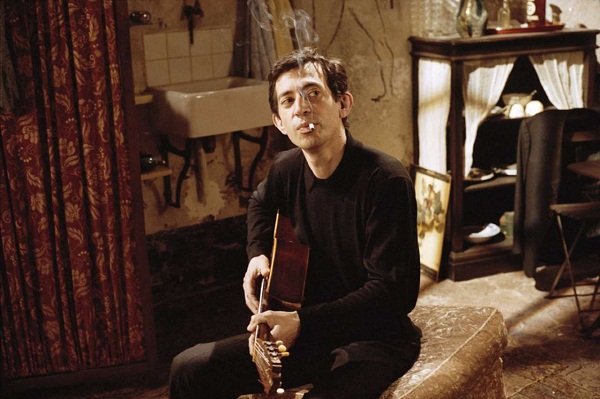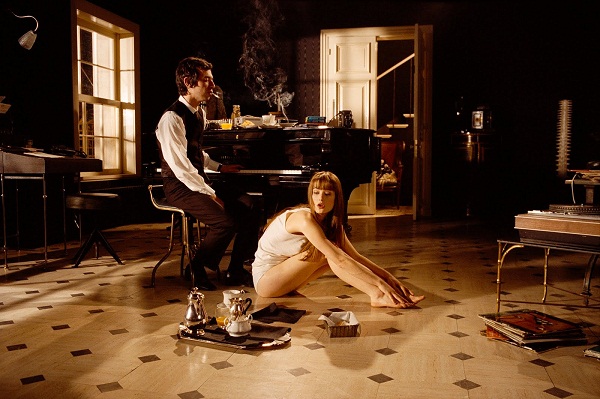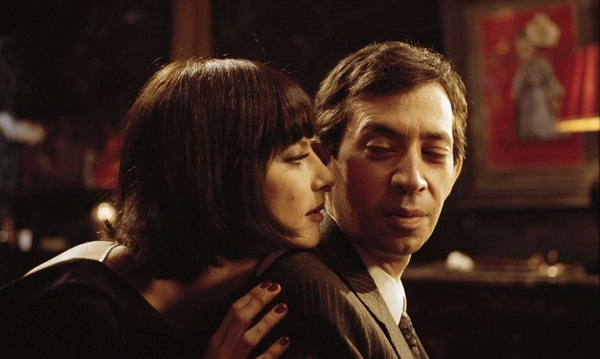|
Writer-director Joann Sfar's Gainsbourg is yet
another recent biopic from France. Based on the life of iconic French
painter, singer, composer, writer, poet, and actor Serge Gainsbourg
(born Lucien Ginsburg), the first half of the film looks his childhood
in a Paris under German occupation. The second, looks at the
chain-smoking, hard-drinking legend of the 60s and 70s French musical
scene, and some of his numerous affairs, including those with Juliette
Greco, France Gall, Brigitte Bardot, and Jane Birkin. Birkin would later
become his wife and his greatest muse.

It's 1941,
and the Germans have just occupied France. In Paris, twelve year old
Lucien, like all French Jews, is required to wear the yellow star of
David. Claiming to be a good friend of the local head of the SS, Lucien
is first in line as he 'demands' his star. As he walks down the street,
he's shadowed everywhere by a giant humpty-dumpty look-alike monster;
this is the ghost of anti-Semitism that would follow him throughout his
life. The monster eventually morphs into 'La Gueule' (the mug), a
prosthetic caricature-like representation of Gainsbourg's alter-ego,
complete with a hooked-nose and jug ears. La Gueule, masterfully played
by Doug Jones, taunts Gainsbourg into drinking and smoking and leads him
into all sorts of mischief, much to Gainsbourg’s eventual chagrin.
The film is
thin on detail, particularly on Gainsbourg's early years, and there’s no
mention of his two previous marriages before he meets Bardot and Birkin.
This is precisely how Sfar had intended Gainsbourg to be – not a
biopic, but rather, a celebration of the man and his music, with
particular emphasis on his most creative period from 1966 to 1971.

Eric
Elmosnino is superb in the title role. His performance is awe-inspiring;
he is Gainsbourg. He talks and sings like Gainsbourg, and he does
it so naturally, without having to imitate or mimic the man. It is truly
remarkable, and is without doubt, one of the most outstanding
performances I have seen in recent times. Laetitia Casta lights up the
screen as the deliciously sexy Bardot, while running around Gainsbourg's
apartment wrapped in a bath towel. Anna Mouglalis is outstanding as
Greco, as is Kacey Mottet-Klein as the young Lucien. Mylene Jampanoi is
sympathetic as Bambou, Gainsbourg's last partner. Tragically, British
actress Lucy Gordon who plays Birkin, had committed suicide prior to the
release of the film, and the film is dedicated to her memory.

By his own
admission, Sfar is a lifelong admirer of Gainsbourg. The bond between
the two seems indelible; no doubt strengthened by their common Jewish
ancestry. The film, Sfar's first feature, is a labour of love, and it
shows. He wanted Gainsbourg to be as authentic as possible. This
meant no original recordings of Gainsbourg's songs, and that meant in
turn, no lip-synching. According to Sfar, "Everything will be re-done,
re-worked, resung, and become larger than life", with Gainsbourg's
signature song, Je t'aime, moi non plus being the only one
presented in its original version. To this end, Sfar along with composer
Olivier Daviaud, and production designer Christian Marti have succeeded
brilliantly.
Gainsbourg
is bold, innovative, engaging, but above all, a visually stunning film.
|